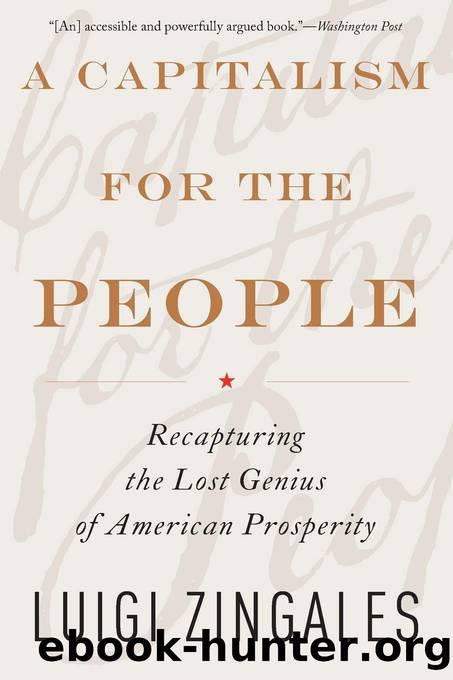A Capitalism for the People by Luigi Zingales

Author:Luigi Zingales [Zingales, Luigi]
Language: eng
Format: epub
Published: 2012-04-09T16:00:00+00:00
THE WRONG FIXES
One natural political response to this state of affairs is protectionism. Given the economic fundamentals, there has been surprisingly little pressure for that so far. One possible explanation is that support for protectionism is strongest among low-skilled manufacturing workers, who have little political influence and whose cry for government aid has made little impression on an intellectual elite that, by and large, has benefited from free trade and the exportation of American values and culture all over the world.
The balance of power may change as those who wield political influence begin to feel the effect of free trade. When accountants, lawyers, and professors start to lose their jobs or see their compensation cut because of foreign competition, they will lobby to protect the domestic market. Already, Internet firms provide legal services, and in time Chinese or Indians trained in US law might do the work from thousands of miles away.34 Can online college courses featuring foreign professors be far behind? Interestingly, by that time the workers might turn in favor of free trade: they have nothing more to lose, while they can benefit from the falling price of professional services.
Protectionism is not the solution, because the problem arises not from free trade (though free trade amplifies it) but from the nature of the technology. Letâs go back to the golf tournament example. Imagine that, tired of foreigners dominating the Masters Tournament, Americans decided to prevent them from participating. Initially the effect might seem positive, since American stars would see their odds of winning roughly double. Over time, however, the tournament would lose prestige. Foreign golf fans would stop watching it, and foreign sponsors would stop endorsing it. Even the best American golfers would desert it. Why waste time in a regional competition, when other tournaments (like the British Open) gather the best of the best? The only beneficiaries of the protectionism would be the current also-rans.
The same is true in the industrial sector. Protectionism will not permanently solve the problem of low-skilled workers or benefit the US economy overall. But it might temporarily benefit a few incumbents: from the low-skilled workers nearing retirement who receive a year or two more of employment to the accountants, lawyers, and consultants who make a good living today thanks to their established relationships that marketplace competition will disrupt tomorrow.
The second obvious fix is to slow down or stop technological changeâthe cause of increasing income inequality. Why not deal with it directly? This is a time-honored strategy. When the steam engine was invented, stagecoach owners lobbied to require that all trains be preceded by a horseman waving a flag for âsecurity reasons.â While the measure did not change the future of trains, it did slow down their adoption, with little benefit for anyone except the coachmen.
There is a natural tendency to idealize dying professionsâa century ago farmers, today booksellers. But this sympathy is a way of expressing nostalgia for old ways of living, nostalgia that disappears as the people who lived that way die.
Download
This site does not store any files on its server. We only index and link to content provided by other sites. Please contact the content providers to delete copyright contents if any and email us, we'll remove relevant links or contents immediately.
International Integration of the Brazilian Economy by Elias C. Grivoyannis(57325)
The Radium Girls by Kate Moore(10907)
Turbulence by E. J. Noyes(7039)
Nudge - Improving Decisions about Health, Wealth, and Happiness by Thaler Sunstein(6633)
The Black Swan by Nassim Nicholas Taleb(6192)
Pioneering Portfolio Management by David F. Swensen(5606)
Rich Dad Poor Dad by Robert T. Kiyosaki(5149)
Zero to One by Peter Thiel(4824)
Man-made Catastrophes and Risk Information Concealment by Dmitry Chernov & Didier Sornette(4736)
Secrecy World by Jake Bernstein(3783)
Millionaire: The Philanderer, Gambler, and Duelist Who Invented Modern Finance by Janet Gleeson(3569)
Skin in the Game by Nassim Nicholas Taleb(3462)
The Age of Surveillance Capitalism by Shoshana Zuboff(3423)
The Money Culture by Michael Lewis(3284)
Skin in the Game: Hidden Asymmetries in Daily Life by Nassim Nicholas Taleb(3264)
Bullshit Jobs by David Graeber(3180)
The Dhandho Investor by Mohnish Pabrai(3169)
The Wisdom of Finance by Mihir Desai(3079)
Blockchain Basics by Daniel Drescher(2891)
